DHDD Newsletter – November 2022
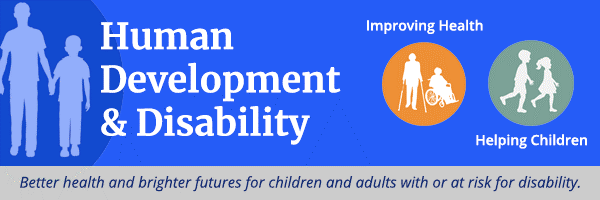
A Note from the Acting DHDD Director
Dear DHDD Partners,
As the holiday season unfolds and we turn to thoughts of gratitude, I am so thankful for the opportunity to get to know many of you and to work together to optimize the health and development of people with, and at risk for, disabilities.
Early this month, I attended the DHDD Quarterly Partner Meeting, during which I was able to share a little bit about my background and give you a glimpse of my vision for DHDD. Importantly, this also gave me an opportunity to hear more about the integration of disability efforts in systems and policies at state and local levels. Initiatives shared included everything from developmental monitoring to emergency planning, and demonstrated the difference you make in the lives of people with disabilities every day.
I also was fortunate to recently meet many valuable partners in-person at the Association of University Centers on Disabilities (AUCD) 2022 Conference in Washington, DC. Over the course of several days, I was consistently humbled by the amazing work being done towards achieving health equity for people with disabilities. It was invigorating to witness the focus on social and structural determinants of health. I was especially thrilled to the see community engagement at the center of these efforts.
In the coming months, I look forward to meeting more DHDD partners and exploring collaboration opportunities. Wishing you and yours a wonderful holiday season filled with restful moments and fond memories made.
Sincerely,
Karyl Rattay, MD, MS, FAAP
DHDD Director
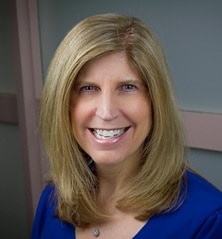
Dr. Karyl Rattay, DHDD Director
In the Spotlight
2022 APHA Conference Highlights
Several DHDD leaders and staff participated in the American Public Health Association (APHA) Annual Conference in Boston, Massachusetts this year. The conference theme celebrated 150 years of APHA and the advancements in public health science and policy, while recognizing persistent health disparities and the need to address inequities. DHDD highlights included:
- Joe Holbrook, Disability Science and Program Team Lead, moderated the APHA Disability Section Business Meeting and provided the keynote address.
- DHDD communications team received the Health Equity Award from the APHA Disability Section for their work on COVID-19 accessible communication.
- JoAnn Thierry, Senior Behavioral Scientist, presented on the development of tailored, audience-tested COVID-19 materials for people with hearing, vision, cognitive, mobility, and self-care disabilities.
- Robyn Cree, Epidemiologist, and Allison Wray, ORISE Fellow, presented a poster on the moderating role of disability status on the association between adverse childhood experiences and mental and behavioral disorders among children.
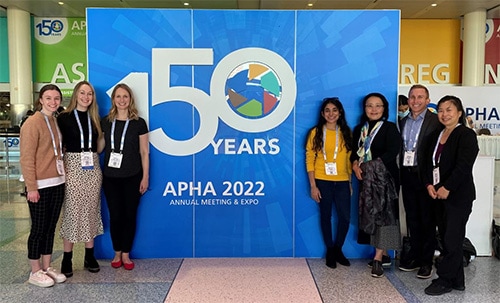
Disability Science and Program team members gather in the exhibit hall at the 2022 APHA Annual Conference.
DHDD also enjoyed the opportunity to connect in-person with partners, such as Special Olympics, Association of State and Territorial Health Officials, National Association of County and City Health Officials, state health departments, and many others. We look forward to continued collaboration and partnership!
Congratulations to Dr. Blythe Ryerson
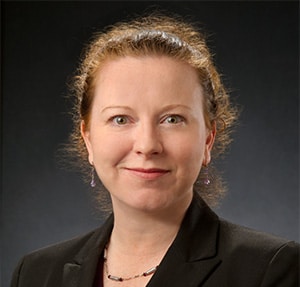
DHDD would like to congratulate Dr. Blythe Ryerson on her new position as the Executive Director of Research and Evaluation for the Georgia region of Kaiser Permanente (KP). In this role, she will be developing and growing KP’s research program, which will have important implications for KP members, the metro Atlanta community, and the public at large. She has over 20 years of service with CDC, and her most recent role was Acting DHDD Director. DHDD would like to thank Dr. Ryerson for her leadership of inclusive programs, surveillance, and research to improve the health and development of children and adults with, or at risk for, disabilities. Prior to her role as Acting Director, Dr. Ryerson served as the Associate Director for Science within DHDD. She was the principal advisor on scientific matters for research papers, congressional inquiries, and other relevant scientific reports. Over the years, Dr. Ryerson also served in various other leadership positions, advising on scientific matters including HIV/AIDS, viral hepatitis, STD, TB, cancer registries, and COVID-19 vaccination.
Please join us in congratulating Dr. Ryerson on her years of service, significant contributions, and new opportunities. She can be reached at blytheryerson@gmail.com.
International Day of Persons with Disabilities
First proclaimed in 1992 by the United Nations (UN), the International Day of Persons with Disabilities (IDPD) is an annual observance on December 3rd that raises awareness of disability issues and builds support for the dignity, rights and well-being of people with disabilities. This year, IDPD highlights the need for transformative change and collaboration to help make the world a more accessible and equitable place.
The UN will host a free online event recognizing IDPD on Monday, December 5, 2022 between 9am – 12pm ET. The event will include an introductory plenary and interactive sessions. Attendees are encouraged to submit their questions and comments in advance of the event. For more details or to register, please visit the UN IDPD web page.
Publications
Surveillance of ADHD Among Children in the United States: Validity and Reliability of Parent Report of Provider Diagnosis

A new CDC study found that using national surveys to ask parents if their child has ever been diagnosed with ADHD is a generally reliable and efficient way to estimate how many children have an ADHD diagnosis. Knowing how many children have ADHD is important for public health, to understand trends and to help with planning treatment and prevention efforts.
Public health professionals and researchers can use parent surveys to track population trends in children’s ADHD diagnosis, but more information is needed about accurate diagnosis and how treatment impacts symptoms.
Key Findings:
- Among parents who reported their child had ADHD, 96% reported it again two years later.
- In a comparison between parent report of ADHD and meeting clinical criteria, most children whose parents reported that they had ADHD and who did not meet clinical criteria had ADHD symptoms just below the diagnostic cut-off or were currently taking medication for ADHD.
- Parent reports of a child ever having been diagnosed with ADHD are generally higher than estimates from clinical assessment. More information is needed to understand to what extent this reflects the accuracy of diagnosis or effective treatment.
Likely Impact of COVID-19 Pandemic on Newborn Hearing Screening and Follow-up
CDC has released findings from the 2020 Hearing Screening and Follow-up Survey, which captures progress in meeting national Early Hearing Detection and Intervention benchmarks. Among infants born in 2020, reductions were seen in follow-up diagnosis and access to services among those who failed their newborn hearing screening. CDC and partner organizations have published an article in the Journal of Early Hearing Detection and Intervention, discussing factors during the COVID-19 pandemic that likely impacted progress in meeting EHDI benchmarks and contributed to these declines. The full article can be accessed here. For a summary of the key findings from this article, click here. Despite the impacts of the COVID-19 pandemic on early hearing detection and intervention, more than 6,000 infants with permanent hearing loss born in 2020 were identified early through newborn hearing screening.
Mental Health Care for Young People with Diabetes
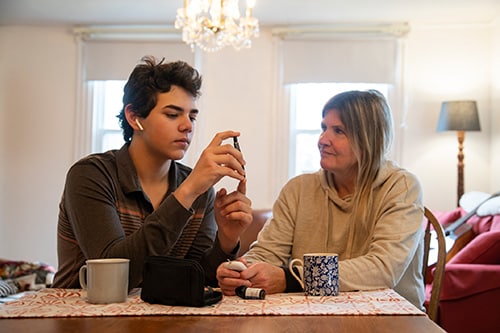
Diabetes has been linked to mental disorders, such as depression, anxiety, and ADHD. With diabetes and mental disorders on the rise, it’s important to understand how these conditions affect America’s youth.
A recent CDC study found that young people with diabetes were twice as likely to have mental, behavioral, or developmental disorders compared to young people without diabetes. These findings show that including mental and behavioral health support in diabetes care could help young people with diabetes.
Learn more about this study and the key results.

